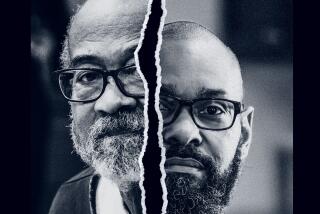31 Years Later, Train Robber Enjoys Life in Rio : Brazil: Scotland Yard knows where Ronald Biggs is but can’t touch him. For $50, however, any tourist can drop by for lunch and hear his tales of the $7.3-million heist and his life on the run.
- Share via
RIO DE JANEIRO — The camera pans in on a luxurious garden in Rio. A tanned, elderly man in a sports shirt and cream-colored slacks is relaxing in a garden chair, shaded by a palm tree.
The smiling man lifts a glass of whiskey, takes a sip, turns and says: “There’s nothing like a good home alarm system when you’re on the run. And if it makes me comfortable, imagine how safe you’ll feel.”
The star of this commercial knows his stuff when the topic is security or how to crack it: He is Ronald Biggs, one of the Great Train Robbers of 1963 who escaped the clutches of British lawmen.
Biggs and 16 other men in stocking masks plundered the Glasgow-to-London Royal Mail Train of $7.3 million.
Twelve of the bandits were convicted and sent to prison, but Biggs escaped. Five were never caught. Police recovered some of the $7.3 million, but it’s not clear what happened to the rest. Biggs managed to stash his booty with various friends in England.
Stalked by Scotland Yard, bounty hunters and foreign police in the aftermath of the legendary holdup, Biggs led his pursuers across three continents before finding refuge in Rio in 1970.
These days, Biggs is not hard to find. A winding, cobbled street up a quiet hillside leads to his “hide-out”--a colonial apartment with a terrace and pool that looks out over shimmering Guanabara Bay.
The Yard has known the address for 24 years. But Biggs is untouchable--as long as he keeps his nose clean and stays where he is.
Biggs worked hard to craft an image as a working-class Robin Hood, a charming rogue who was outgunned and outnumbered but who foiled his enemies and made off with a fortune.
Now a genteel 64, Biggs is sculpting a new image--that of a distinguished chap who has given up his light-fingered ways to lead an honorable, cultured life.
“I like to think of myself as the last of the gentlemen crooks,” said Biggs, leaning back on a leather couch and sipping his favorite tea, Twinings Earl Grey.
“Ours was the last decent crime. Compared to the violent capers of today, why, what we did was puff stuff.”
To make his point, Biggs published in January his second volume of memoirs, “Odd Man Out: My Life On the Loose and the Truth About the Great Train Robbery.”
The book gives Biggs’ version of the robbery and chronicles his marathon battle for freedom and transformation from London hood to pseudo gentleman of fortune.
The title “Odd Man Out” is pure Biggsian irony: “The 11 other men convicted of the crime served sentences in prison. I was the only one who did time out of jail,” he said.
People want to believe in the charming rascal who twisted the British lion’s tail. Many tend to forgive Biggs’ criminal past and not press him on exactly what he did in his underworld days.
Biggs doesn’t resemble the “most wanted” desperadoes whose craggy faces snarl from FBI posters on post office walls. Even in his twilight years, he conjures up a contemporary Beau Brummell.
He can be self-parodying and his humor is soft in tone. His cockney accent is agreeable, his vocabulary precise, rhythmic, with allegro touches.
For a hood, his tastes are quite stylish.
Biggs won’t use anything but Gucci cologne and deodorant, and Cussons shaving cream. He drinks Twinings tea five times a day, loves oysters and enjoys only Harrods cheddar cheese.
He pays great attention to detail, especially with his wardrobe. He likes linen trousers, silk shirts and sleeps in Chanel No. 5 night wear.
A notorious womanizer, Biggs is in his third “marriage,” with Ulla Sopher, an Argentine. They call each other husband and wife, but live in separate houses.
Ronald Arthur Biggs was born in the Lambeth district of London on Aug. 8, 1929. His father was a bus driver and hotel cook. His mother, a housewife, pampered him and his three older siblings.
Young Ronnie started “nicking” candy from corner shops in grade school, and gradually moved on to lead pencil refills and radio parts. At 16, he stole and sold his brother’s gold Rolex watch.
“Stealing meant adventure to me,” Biggs said. “I craved the thrill.”
His adventures landed him in prison six times by his 28th birthday. In 1957, Biggs met his first wife--18-year-old Charmain Powell--on a train. They married and had three sons, and Biggs set up a construction firm.
The business soured and in 1963 Biggs sought out an old prison mate, Bruce Reynolds, for a loan. The smooth-talking Reynolds instead offered him a role in a train-robbing scheme they had always dreamed of.
On a moonlit August night, the gang halted the Royal Mail Train at the Buckinghamshire junction north of London and vanished with 125 bags of pound notes earmarked for the shredder.
There was but one hitch--the injury to Jack Mills, 57, the chief engineer.
Mills fought his assailants and was rapped on the head with a tape-wrapped ax handle. He got 11 stitches but never fully recovered, and died in 1969 of leukemia.
Britain’s press said Biggs was the thug who reduced Mills to a semi-vegetable state--a charge he denied. But years later, Biggs expressed remorse. “I’ve always felt bad about Mills,” he said. “I detest any kind of violence, even a bop on the noggin.”
A jury gave him the maximum 30-year sentence.
Under close surveillance and forced to sew mailbags--a task he hardly found amusing--Biggs scaled the wall of the Wandsworth prison with three other inmates on July 8, 1965.
It began an odyssey that would take him to Paris, where he had a face lift and took on a new identity; to Australia, where he settled three separate times under three aliases with his wife and children.
Finally, with Scotland Yard closing in on him, he left his family behind and made a last-minute escape aboard a luxury liner to Panama. He arrived--virtually broke--in Rio on March 11, 1970.
He lived as a carpenter, and came close to turning himself in only once.
On Jan. 2, 1971, Biggs’ 10-year-old son, Nicky, died in a car accident in Melbourne, Australia. Devastated, he went immediately to the door of the British Consulate. At the last instant, though, he decided against it and walked away.
British authorities finally found him in 1974. But luck was with Biggs too: Brazil had never signed an extradition treaty with Britain. So when Chief Supt. Jack Slipper came with the handcuffs, Brazilian authorities barred him from taking Biggs back.
In another twist, Biggs’ Brazilian mistress--a 23-year-old waitress and call girl--discovered she was pregnant, which protected him under a law that bars the deportation of the father of a dependent Brazilian child.
Still, Biggs was hardly free as a bird. Twice a week he had to report to the police. He couldn’t work or marry, stay out past 10 p.m. or leave Rio.
Once he did, but it wasn’t his idea. One afternoon in 1981 a man identifying himself as a foreign journalist asked to interview him at a restaurant at the base of Rio’s Sugar Loaf Mountain.
Two men jumped Biggs, blindfolded and gagged him, and threw him in a canvas sack. A Learjet flew him to the Amazon port city of Belem, where he was put on a yacht that set sail for Barbados.
Then another lucky stroke: The Barbados Parliament had not voted on an extradition treaty with Britain, and Biggs was returned to Brazil. The episode turned Biggs into a cult figure. And he has milked his fame plenty.
His best scam comes from travel agencies who arrange for foreign tourists to have lunch with the Great Train Robber at his home--at $50 a head.
Biggs throws a few steaks and sausages on the barbecue, cracks open a few liters of rum and whiskey, has a few girls dance a samba around the pool, and spins yarns of his famous flight.
In November, Brazil rejected Biggs’ request for permanent residency, but allowed Biggs to marry, adopt a child and travel out of Rio state.
And he’s safe from deportation, at least until his son, Michael, turns 21 in two years. What will he do then?
“As long as Mike is in school, he’s legally my dependent,” Biggs said. “Who knows? Maybe he’ll become a professional student.”
More to Read
Sign up for The Wild
We’ll help you find the best places to hike, bike and run, as well as the perfect silent spots for meditation and yoga.
You may occasionally receive promotional content from the Los Angeles Times.






